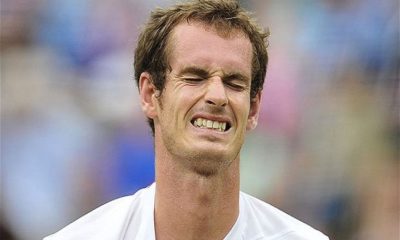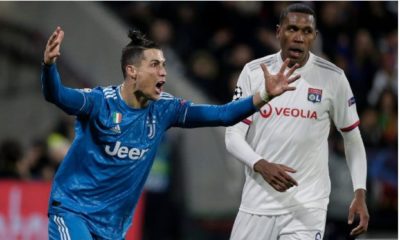Boxing & UFC
Latest Transfer Update:– Romelu Lukaku Leaves Man United With His League Legacy Intact

Romelu Lukaku has ended his eight-year stay in England having scored 113 goals in 252 Premier League appearances
Lukaku’s time in England is book-ended by disappointment. As a teenager at Chelsea, he was unable to make a first-team breakthrough, forcing him out on loan before an eventual permanent departure. Then, in his final season at Manchester United, he struggled for form, drifting in and out of the team and scoring just 15 goals in 45 appearances.
Few Manchester United fans will lose sleep over his exit. His poor scoring record against United’s top-six rivals was a source of frustration and there were stylistic questions, too. But it is a measure of his scoring exploits in English football that a 15-goal season – by no means a disastrous total – will rank as his worst since his breakthrough in 2012/13.
Lukaku hit 17 goals that year, helping loan side

Mandatory Credit: Photo by Luca Bruno/AP/Shutterstock (10357451b)
Soccer forward Romelu Lukaku waves at Inter Milan supporters from a window of the Italian Olympic Committee’s headquarters, in Milan,Italy, . Manchester United forward Lukaku is on the verge of completing his move to Inter Milan on the final day of transfers in England
Soccer Lukaku, Milan, Italy – 08 Aug 2019
Lukaku’s tally of 113 Premier League goals puts him level with Ian Wright inside the top 20, and the feat becomes even more impressive when you consider he only turned 26 in May.
Last year, the Belgian became the youngest overseas player to reach the 100-mark. Only Michael Owen, Robbie Fowler, Wayne Rooney and Harry Kane have achieved that feat at a younger age. Lukaku has scored more Premier League goals than Alan Shearer at the same age.
Lukaku’s record places him in esteemed company, but while the others in that list are celebrated as some of the Premier League’s finest frontmen, with Lukaku, the focus tends to fall on his limitations. His large frame means he can appear ungainly at times. Every poor touch, every moment of miscontrol, tends to be seized upon by his critics.
Those moments became increasingly frequent last season as his form tailed off following a bright start, but his 27-goal debut campaign at Old Trafford should not be brushed over. In his second year, there were also significant factors working against him.
0:22
Romelu Lukaku waves to fans and press in Italy ahead of his move from Manchester United to Inter Milan.
For a start, there was the issue of fatigue.
Lukaku may only be 26, but having broken through at Anderlecht at 16, he has already been playing regularly at senior level for a full decade.
The sheer number of games he has played – close to 500 – is extraordinary for a player of his age. His total includes 81 appearances for Belgium. Last summer, after a 51-game domestic season with Manchester United, there was a gruelling run to the World Cup semi-finals in Russia.
He performed impressively there, of course, becoming the first player to score two goals in consecutive World Cup games since a certain Diego Maradona in 1986, but it is hardly surprising that the workload took a heavy toll. Lukaku has admitted himself that bulking up for that tournament compounded his problems afterwards.
“In the Premier League, I cannot play with the same amount of muscle as international football,” he said in December. “That was something that when I came back I knew straight away. I wasn’t playing with enough intensity or aggression. I had to lose muscle, basically.”
Those comments came just a few weeks after the issues had caused him to aggravate a hamstring injury, and he spent the rest of the season playing catch-up. There were highlights – most notably his two-goal performance against PSG in March – but the hamstring problem continued to hamper him, later ruling him out of United’s final two games of the campaign.
Lukaku’s perceived lack of fitness prompted criticism from some quarters, but any questions over his professionalism do not tally with the views of those who know him best.
Roberto Martinez, now his coach with the Belgian national team, praised his “desire and discipline” at Everton. Jose Mourinho frequently lauded his “fantastic attitude” at Manchester United. As recently as March, Ole Gunnar Solskjaer was echoing Mourinho’s words when talking up Lukaku’s extra work on the training pitch.
Romelu Lukaku spent three seasons with Everton
Romelu Lukaku spent three seasons with Everton
Those traits were apparent to team-mates as well as coaches. “His determination to improve is the biggest feature I’ve picked up from his game,” said Marcus Rashford, the man who has now overtaken him in the Manchester United pecking order. “He always wants to better himself. When he’s doing it, it pushes others to be better.”
Indeed, while Lukaku has averaged a goal nearly every other game in English football, his scoring threat is not all he offers on the pitch. His stature means he is sometimes pigeonholed as a target man, an old-fashioned player in an evolving game, but it is a reductive categorisation.
Lukaku is a maker of goals as well as a scorer of them. Since the start of the 2012/13 season, he has provided 34 assists in the Premier League. The only strikers to have provided more in the same time-frame are Sergio Aguero, who has 35, and Wayne Rooney, who reached 38 largely thanks to his move back into midfield.
Lukaku provided a fine demonstration of his underrated technical ability in his final United appearance. Having dropped into a pocket of space to receive Paul Pogba’s pass in an inside-left position, he sent a brilliant, deft chip into the path of Luke Shaw, whose cut-back was converted by Juan Mata.
It was further proof that, unlike a traditional target man, Lukaku is far more effective when facing a defence rather than playing with his back to it.
In fact, many of the best performances of his career have come from wide on the right, where his pace and directness can be harnessed to devastating effect on the counter-attack.
He has destroyed Arsenal twice from that position – once in the FA Cup with Manchester United last season and once with Everton in 2014 – and he was even more impressive there in Belgium’s 2-1 over Brazil in last year’s World Cup quarter-final, tormenting defenders Marcelo and Miranda and laying on the assist for Kevin de Bruyne’s decisive goal.
One difficult season later, however, and Manchester United have decided to move forward without him.
Perhaps he was simply not the right fit for them. Perhaps they will emerge stronger next season. But what’s certain is that Lukaku leaves English football as one of the Premier League’s most prolific strikers. He was misunderstood, his achievements underrated, but his goals alone ensure his legacy will stand the test of time.
































